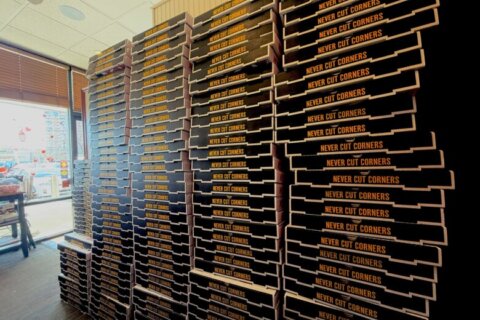“It can be worms. It’s not always worms!”
That’s the response from Arlington resident Hannah Moskowitz to people who freak when hearing worms are sometimes used for composting.
Moskowitz is the sustainability director at RTS (Recycle Track Systems), a national hauler for sustainable waste. She says the use of worms in composting, known as vermicomposting, is just the backyard version.
“The food waste that’s collected in Arlington is not going to worms,” she said. “That’s a really, really large scale process where they’re collecting all the food scraps. It’s going most likely to P.G. County’s composting facility and its getting put in giant piles. And those are getting really hot and they’re adding oxygen, so its breaking down into compost, into soil.”
No worms involved.
As Earth Month winds down, people should know that options are available around the DMV to get rid of food waste in ways that are more beneficial to the planet than sending scraps to the dump.
How it’s really working
Arlington County made a push toward more composting last year when it distributed 2-gallon caddies and compostable bags to residential trash customers. Residents were urged to put food scraps they save up during the week into green organic yard waste bins for collection and composting, instead of incineration.
On this past Earth Day, Montgomery County Executive Marc Elrich, representatives from the County Department of Environmental Protection (DEP), the County Master Gardeners and resident volunteers participated in an event in Bethesda to highlight the “Backyard Food Scraps Composting Project” which focuses on programs for backyard food scraps composting and yard trim composting.
Those behind Montgomery County’s Backyard Food Scraps Composting Project say that compost is beneficial to the environment. They say that adding finished compost to soil can improve the health of lawns, plants and gardens by adding nutrients to the soil. Composting also saves money by reducing the need to buy fertilizers.
As a part of that initiative, last fall 475 Montgomery County resident volunteers began using and testing one of two backyard bins designed for composting food scraps.
Between November and the end of March, 70 volunteers in the program had composted more than 1,700 pounds of food scraps in their backyards. Elrich says that amounted to an average of six pounds of food scraps a month per volunteer.
But what if you live in an apartment or condo, don’t have a backyard to do your own composting or don’t even have trash collectors that pick up organic waste?
In Arlington, anyone can drop off their food scraps at the Arlington County Trades Center from 7 a.m. to 3:30 p.m., Monday through Saturday.
Also, various farmers markets, including the Columbia Pike Farmers Market, offer free drop-off stations for composting.
That’s what Tracy Huerta does. She says she uses her freezer to save scraps from the fruit and vegetables she feeds her children. Then, when she goes to the Farmers Market on Sundays, she dumps those potato peels and the green tops of strawberries in a green can situated near the food stalls.
“The market is organic,” said Huerta. “We know that the soil that comes from composting is organic and that helps in planting.” She’s says the number of people showing up to use the compost bin is growing.
Moskowitz agrees that properly disposing food waste is important because it can be made into compost that goes into soil to plant more crops.
In the United States, between 30-40% of the food supply ends up as food waste, according to the U.S. Department of Agriculture.
That makes for 108 billion pounds of food waste in the U.S. each year, according to Feeding America.
“That’s a lot that’s just sitting in landfills breaking down. Why not have that breakdown into compost that can be used again to plant more crops?”
In addition, Moskowitz says how we dispose of food can have an effect on climate change.
“Food waste that’s thrown away in plastic bags results in methane being released,” said Moskowitz. “And it’s just contributing to climate change.”
Resources
For more about food scrap recycling in Arlington, visit their website.
To learn more about how to participate in Montgomery County’s Backyard Food Scraps Compost Project, visit their website.
For District of Columbia residents, you can earn a maximum annual rebate of $75 on a home composting system through the Department of Public Works’ Home Composting Program. For more information, visit D.C.’s Zero Waste website.








